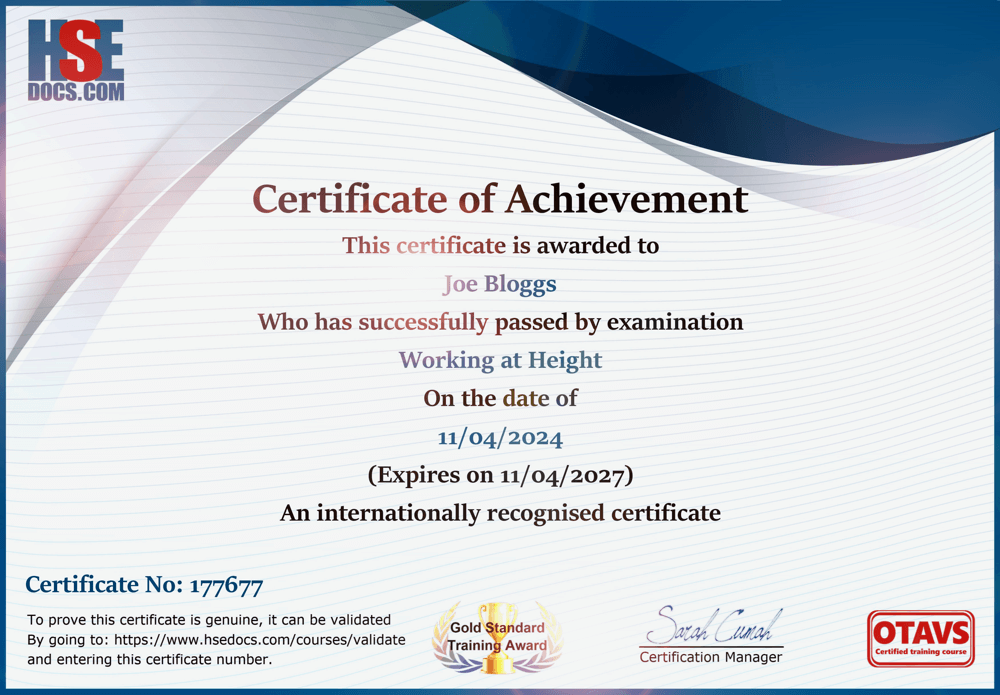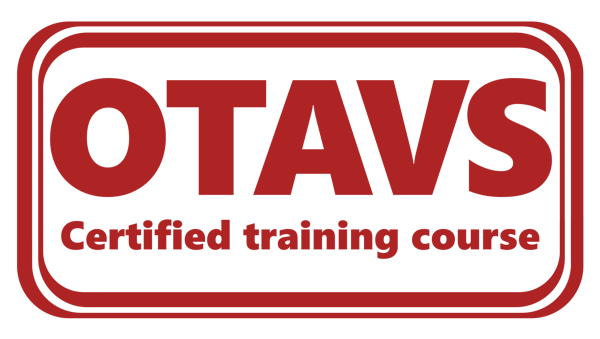Online Level 1 Food Hygiene Course
AKA Food Safety Level 1
Course certificate valid for 3 years
Internationally accredited training
Online Safety training by HSEDocs.
Covering UK and Scottish laws.
This course is ideal for anyone who handles pre-packaged foodstuffs and uncooked fruits and vegetables.
£9.99 for an individual course, £6.49 if you buy 10 or more, and just £4.99 for bulk orders of 50 or over.
This course is accredited and certified by OTAVS.
Online Training Accreditation & Verification Service
Course duration: Between 1 ½ and 2 ½ hrs depending on learning speed.
Course format: Three video training modules, with a multiple-choice section at the end of each module.
Entry Requirements: Anyone can complete this Level 1 Hygiene Course, whether they have previous experience or not.
This course is suitable for you If you do not prepare or directly handle high-risk foodstuffs, such as shellfish, prawns, crabs, uncooked meat, poultry, or any unwrapped foodstuffs except for fruit and vegetables.
For instance, employees who work in bars, for charities, front-of-house employees, retail stores, delivery drivers and riders.
If you work in a cafe, chip shop, restaurant, mobile catering unit, or kitchen, you must complete a Level 2 Food Hygiene certificate.
Upon completing your online hygiene course, your training certificate will be valid for three years. Local authorities and environmental health officers recognise it and count towards your hygiene rating.
All successful candidates are entered on the national training register, and employers or others can verify certificates to prove they are genuine by clicking Validate a Certificate and typing in the certificate number.
Course Overview
Our Level 1 Food Hygiene Course is aligned with the national curriculum and covers the essentials for a level-one food handler.
The learning topics covered in this course include:
- Personal and workspace hygiene.
- Risk assessment and control measures.
- Temperature control and its importance.
- Cross-contamination risks.
- Hazards and how to avoid them.
Personal and workspace hygiene highlights the relevance of cleanliness and what can go wrong if exacting standards aren’t met.
The risk assessment section explains how and why risks should be evaluated in a food environment and how to implement control measures to reduce or eliminate them.
The importance of temperature control explains why temperature control is so important when storing or cooking foodstuffs.
The potential for food poisoning due to cross-contamination is a significant threat. Our course provides comprehensive knowledge and advice to prevent this.
The final section deals with avoiding hazards using HACCP (Hazard, Analysis, Critical, Control, Point) to record, monitor, and reduce probable risks.
Local authorities recognise our Level 1 Food Safety certificate, Environmental Health Officers and counts towards your Hygiene Rating, which you can find out more about in our blog - ‘Your Guide To Food Hygiene Ratings.’

A Level 1 Food Hygiene Certificate is aimed at individuals who are just starting out in food-related roles or those who don't handle foodstuffs directly but work in environments where knowledge of food safety is beneficial. This certification covers the fundamentals of food hygiene, highlighting the importance of cleanliness, proper food handling practices, and ways to avoid contamination.
This certificate is typically used by people in sectors such as hospitality, catering, food production, and retail. For example, kitchen assistants, waiting staff, baristas, and warehouse workers involved in food storage can all gain from this training. Even if their jobs don’t involve direct food preparation, their actions can significantly affect the safety and quality of food products.
The Level 1 Food Hygiene Certificate is especially recommended for new hires or entry-level employees who need basic insights into food safety. It's also beneficial for volunteers in community centres, schools, or charitable organisations that serve food.
Ensuring good hygiene at all points of a supply chain is essential, and those not immediately handling foodstuffs can still contribute to potential risks if proper standards aren’t upheld. Basic training, such as the Level 1 Food Hygiene Certificate, teaches awareness and personal responsibilities.
If you work in the retail or hospitality industry and handle or serve prepackaged or cooked foodstuffs, a Level 1 Food Hygiene Certificate is the minimum requirement you need. This certification proves that you have the necessary knowledge and understanding of the proper procedures for handling food and maintaining a safe environment for storage.
This course is not just about learning. It's about meeting legal training requirements for both employers and employees. By the end of the course, individuals will have the knowledge and skills needed to meet their legal obligations and maintain high standards of food hygiene, ensuring the safety of your customers and contributing to your company's FSA rating.
Training is a legal requirement, ensures the safety of your customers and contributes to your company's FSA rating, which measures how well your establishment is doing in terms of food hygiene.
This course is a practical guide to preventing foodborne illnesses, maintaining quality, and protecting customers' health. It covers all topics, from storage to preparation, and emphasises the importance of hygiene and cleanliness. By providing hygiene training, successful candidates can ensure they have the knowledge and skills to maintain a safe and healthy environment.
The amount of hygiene training you need will be based on various factors, primarily your job responsibilities and daily duties. This aligns with EC Regulation 852, which specifies that your safety training should match your job role. We've created a helpful guide to help you determine the level of hygiene training required in a work setting.
| Food Hygiene Level Guide | |
|---|---|
| Front of House & Wait Staff | Level 1 |
| KPs & Delivry drivers | Level 1 |
| Line Cooks | Level 2 |
| Kitchen Managers & Supervisors | Level 3 |
| Restaurant Owners or Ops Managers | Level 4 |
Understanding the Differences in Safety Training Levels
Different levels of safety training cater to individuals' varying needs and responsibilities in food handling. Basic safety training is the foundation for individuals new to a position where they handle foodstuffs. This level of training is designed to introduce essential principles and practices for maintaining safety and hygiene in food-related environments. The primary aim is to ensure that participants understand the importance of food safety and can implement fundamental measures to prevent contamination and foodborne illnesses.
Key topics covered at this level include personal hygiene, proper handwashing techniques, and safe food handling practices, such as preventing cross-contamination and maintaining appropriate storage temperatures. Participants also learn about the significance of cleaning and sanitising surfaces, utensils, and equipment and recognise common food safety hazards.
The target audience for basic safety training includes entry-level service workers, such as kitchen staff, food handlers, servers, and individuals working in food retail settings. It is also suitable for volunteers or temporary workers involved in events that require food preparation and service. By completing this training, participants acquire the foundational knowledge to perform their roles responsibly and contribute to a safe food environment.
Intermediate Food Safety Training:
A Level 2 Food Safety Certificate covers intermediate food safety training, which offers a more in-depth understanding of food safety principles and practices. This level of training is for individuals who prepare dishes in any form, including salads and raw dishes, heating microwave meals or creating complex cooked dishes from scratch.
Key topics explored include looking at foodborne pathogens, allergens, and effective risk management strategies. Participants gain insight into advanced cleaning and sanitation techniques, learn the proper handling and storage of high-risk foods, and receive detailed guidance on preventing cross-contamination.
Advanced Food Safety Training for Leadership Roles:
Advanced safety training is about managing the risks of an establishment and not just the risks that an individual may create. Level 3 Safety training is primarily designed for supervisors and kitchen managers and is about implementing and managing safety systems, including Hazard Analysis and Critical Control Points (HACCP).
Whilst a chef is concerned with the safety of their own workstations, they haven’t the time to care about all of the equipment in a kitchen. Such things as extractor fans and their filters need thorough cleaning at specific intervals to keep them working efficiently and prevent fire risk. The task of planning, maintaining and cleaning fans and filters will fall at the feet of a supervisor or kitchen manager.
Managerial Safety Training:
Level 4 Training goes beyond a supervisory role, encompassing staff management and taking responsibility for all aspects of a food-related business, from floor coverings to the condition of utensils. Where a supervisor may report an issue, it’s often a manager who makes the phone calls and deals with issues by getting any specialised equipment that’s needed or by employing outside contractors.
Booking a food hygiene course with us is just like shopping at most online retailers. You add a course to your cart, then proceed to checkout. If you already have an account with us, you will be prompted to log in before making a purchase. However, if this is your first time using our platform, you must provide your personal information, which will register you for an account once the purchase is complete.
Your account will allow you to track course progress, store certificates, and view your purchase history. The admin panel offers several viewing options. You can view all courses, available courses, in progress courses, and expired courses.

Contact Our Health & Safety Experts
We are always happy to help at HSEDocs, so if you have any questions or concerns about the online Hygiene course or any other HSEDocs training queries, please give us a quick call.

 CART
CART 














